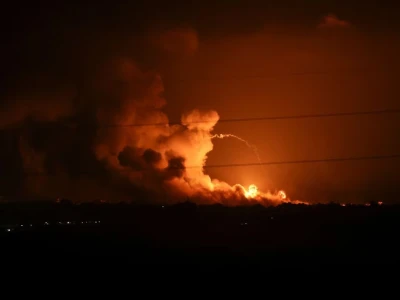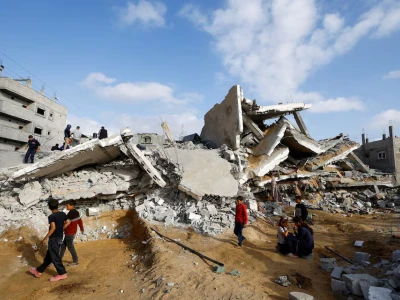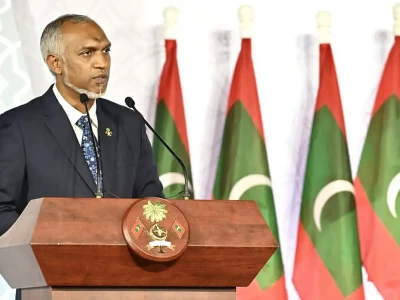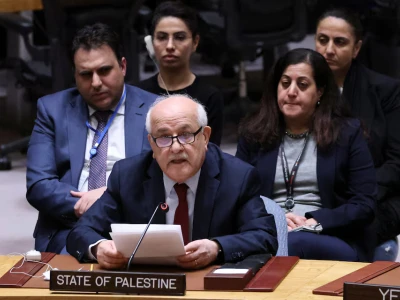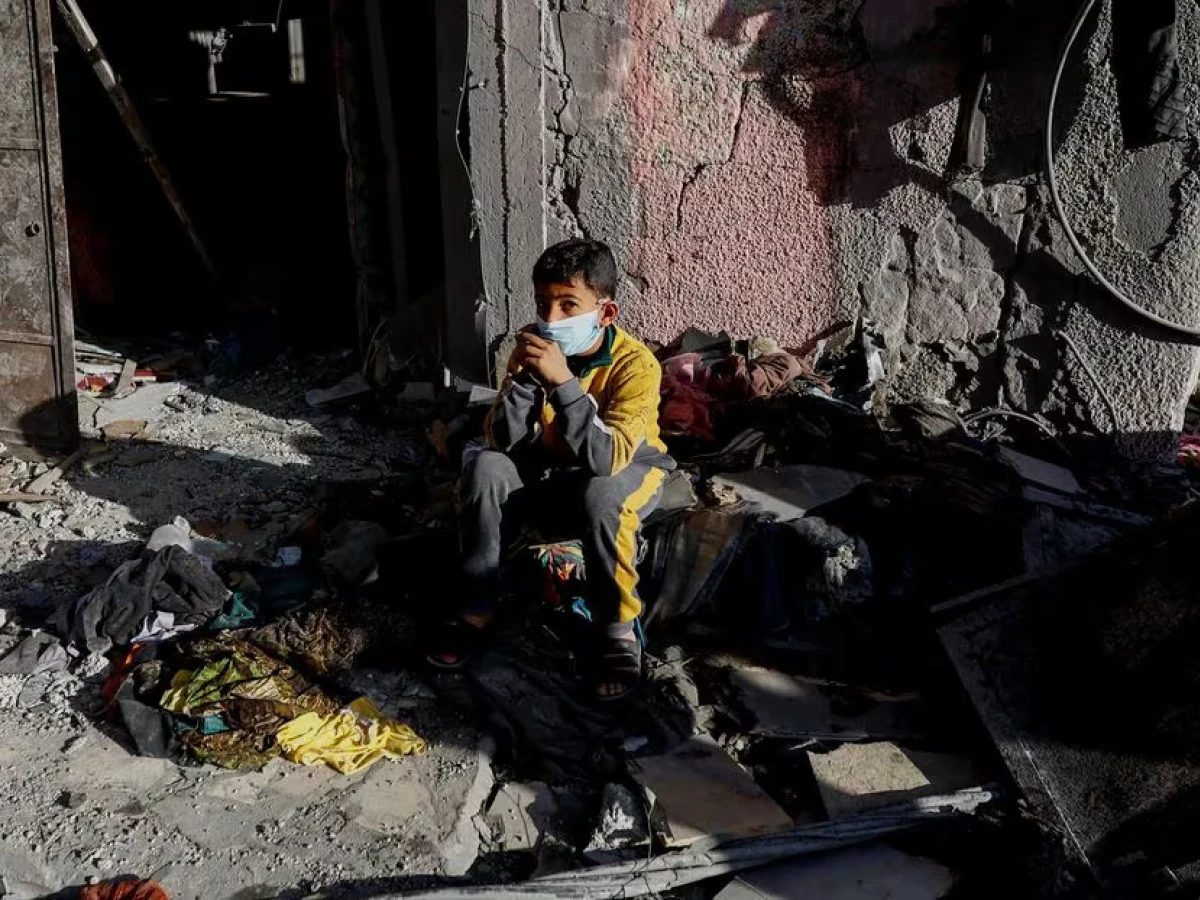
Israel orders more evacuations in Khan Younis after US blocks Gaza ceasefire call
Mahmoud Abbas said the veto made the United States complicit in Israeli war crimes.
GAZA/CAIRO, Dec 9 (Reuters) - Israel ordered residents out of the centre of Gaza's main southern city Khan Younis on Saturday and pounded the length of the enclave, after the United States wielded its U.N. Security Council veto to shield its ally from a demand for a ceasefire.
Since a truce collapsed last week, Israel has expanded its ground assault into the southern half of the Gaza Strip by pushing into Khan Younis. Simultaneously, both sides have reported a surge in fighting in the north.
Israel said its campaign was making progress. National Security Adviser Tzachi Hanegbi said Israeli forces had killed at least 7,000 Hamas militants so far, without saying how that estimate was reached and military chief Lieutenant-General Herzi Halevi told soldiers "we need to press harder".
An official toll of all deaths in Gaza compiled by the Palestinian health ministry in the Hamas-run enclave exceeded 17,700 on Saturday, with many thousands more missing and presumed dead under the rubble. The ministry has previously said about 40% of deaths were of children under 18.
Israel's Arabic-language spokesperson posted a map on X highlighting six numbered blocks of Khan Younis that residents were told to evacuate "urgently". They included parts of the city centre that had not been subject to such orders before.
Israel issued similar warnings before storming eastern parts of the city and residents said they feared new evacuation orders heralded a further assault.
"It might be a matter of time before they act against our area too. We have been hearing bombing all night," said Zainab Khalil, 57, displaced with 30 of her relatives and friends in Khan Younis near Jalal street where troops told people to leave.
"We don't sleep at night, we stay awake, we try to put the children to sleep and we stay up fearing the place would be bombed and we'll have to run carrying the children out. During the day begins another tragedy, and that is: how to feed the children?"
With food and medical supplies also scarce, a senior U.N. World Food Programme official said a new system was being tested to bring aid into Gaza through the Kerem Shalom crossing with Israel, potentially allowing imports to ramp up. However, Israel has not yet agreed to open the crossing.
The vast majority of Gaza's 2.3 million residents have already been forced from their homes, many fleeing several times. With fighting raging across the length of the territory, residents and U.N. agencies say there is now effectively nowhere safe to go, though Israel disputes this.
In Khan Younis, the dead and wounded arrived through the night at the overwhelmed Nasser hospital.
A medic ran out of an ambulance with the limp body of a small girl in a pink tracksuit. Inside, wounded children wailed and writhed on the tile floor as nurses raced to comfort them. Outside, bodies were lined up in white shrouds.
THOUSANDS MISSING PRESUMED DEAD
Footage obtained by Reuters inside another hospital in Deir al-Balah, the Jaffa hospital, showed extensive damage from a strike on a mosque next door. The obliterated ruins of the mosque could be seen through the blown-out windows.
Medical workers in northern Gaza, where some of the heaviest fighting is taking place, accused Israel of targeting hospitals and ambulances.
An ambulance worker in Gaza City's Shejaiya district told Reuters crews were often unable to respond to calls from the wounded and said their teams came under Israeli fire, asking that his name not be printed for fear of reprisals.
Mohammed Salha, a manager at al-Awda hospital, said Israeli forces had besieged the hospital for days with tanks, shooting people trying to get in or out. They shot dead a woman in the street and a hospital worker standing at a window, he said.
The health ministry said Israeli forces had shot dead two medical staffers inside Kamal Adwan hospital, also in northern Gaza, on Saturday.
Jaffa Medical Hospital in Deir al-Balah, in the central Gaza Strip, said it had stopped operating on Friday due to extensive damage when Israel bombed a mosque nearby.
Northern Gaza families were posting messages on the internet pleading with emergency crews to venture into Gaza City.
Asked for comment on Palestinian accounts of attacks on medical facilities, a spokesperson for the Israeli military said it followed international law and takes "feasible precautions to mitigate civilian harm".
The military has previously said Hamas operates from medical facilities, releasing footage to support that claim. Hamas has denied doing so.
U.S. VETO MAKES WASHINGTON 'COMPLICIT'
At the United Nations on Friday, Washington used its veto to reject a vote by 13 of the Security Council's 15 members backing a resolution calling for an immediate humanitarian ceasefire. Britain abstained.
Israeli Prime Minister Benjamin Netanyahu said he appreciated Washington's veto, adding that "Israel will continue our just war to eliminate Hamas".
Israel launched its campaign to annihilate Gaza's Hamas rulers after their fighters burst into Israeli towns on Oct. 7, killing 1,200 people and capturing 240 hostages, according to Israeli tallies.
Israeli forces say they are limiting civilian casualties by providing maps showing areas that are safe, and blame Hamas for harming civilians by hiding among them, which the fighters deny. Palestinians say the campaign has turned into a scorched-earth war of vengeance against the entire population of an enclave as densely-populated as London.
Washington has said it told Israel to do more to fulfill promises it made protect civilians in the next phase of the war. But Washington still backs Israel's position that a ceasefire would benefit Hamas.
"We do not support this resolution's call for an unsustainable ceasefire that will only plant the seeds for the next war," Deputy U.S. Ambassador to the U.N. Robert Wood told the Security Council before exercising Washington's veto.
Ezzat El-Reshiq, a member of Hamas' political bureau, condemned the U.S. veto as "inhumane". Mahmoud Abbas, president of the Palestinian Authority which lost control of Gaza to Hamas in 2007, said the veto made the United States complicit in Israeli war crimes.
